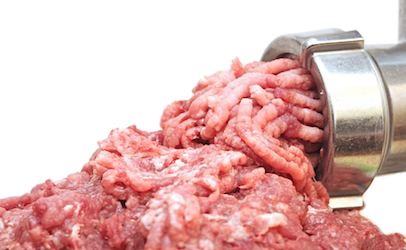FSIS Comes Full Circle With Grinder Logs and Faster Tracebacks to the Source
FSIS Comes Full Circle With Grinder Logs and Faster Tracebacks to the Source
By Dan Flynn | August 14, 2014
It was not so long ago that USDA meat inspectors and their supervisors didn’t even want to hear it. Ground beef from a small Miles City, MT, processor was contaminated with E. coli O157:H7, but the men from the federal Food Safety and Inspection Service (FSIS) did not want to know that all the beef trim it was grinding came from a big slaughterhouse down near Denver.
A dozen years ago, USDA would shut down the small plant where the E. coli was found without tracing the problem back to its source. That was not in their job descriptions. But now, maybe those bad old days at FSIS are finally over.
On Wednesday, USDA announced that FSIS is adopting new procedures to trace contaminated ground beef back to the source “more quickly.” One tool will be grinder logs that small retail meat shops will now have to maintain.
John Munsell, who owned that small meat plant in Miles City during its epic confrontation with USDA, today tries to help other small plants through his Montana-based Foundation for Accountability in Regulatory Enforcement.
When he learned of the latest changes in July, Munsell noted that its only been since Oct. 8, 2010, that USDA meat inspectors were even allowed to document the source information on meat sampled by its own inspectors. In other words, tracebacks were forbidden, an issue Munsell began disputing in 2002.
When these changes became known, Munsell said he had to “chuckle” that tracebacks are now viewed by FSIS as a food safety prevention tool with “the most significant public health impact.”
Brian Ronholm, USDA’s Deputy Under Secretary for Food Safety, says the procedural changes now are all about prevention of foodborne illness.
“A critical component of preventing foodborne illness is quickly identifying sources of contamination and removing unsafe products from store shelves,” he said, adding that the expedited traceback procedures will make a significant difference in food safety investigations.
Under the new procedures, FSIS will conduct immediate investigations at businesses where ground beef tests positive for E. coli 0157:H7 during initial testing, and probes will extend to the suppliers that provide source materials. Traceback investigations will begin as soon as FSIS receives the presumptive positive result and the grinding facility can provide supplier information.
According to the USDA announcement, since 2010 FSIS began investigations at the grinding facility only after a presumptive positive test result was confirmed, which can take two days. So beginning investigations at the point of a presumptive positive test result can save FSIS valuable time.
As part of the traceback investigation, FSIS said it will review establishment records to determine whether the grinding or supplying establishment’s food safety system experienced a breakdown. The agency will also determine whether the supplying establishment shipped product that may be contaminated to other grinding facilities or additional processors. If so, FSIS will take steps to have that product removed from commerce, so more unsafe products will be recalled faster.
The new procedures go into effect 60 days after publication in the Federal Register, which will be on Oct. 14, 2014.
© Food Safety News
